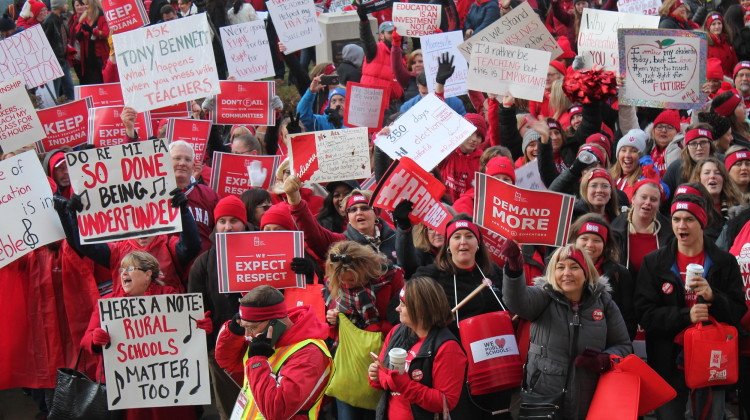
Black high school students in Indiana were nearly three times as likely as White students to receive a waiver diploma in 2018-19.
(WFYI file photo)Editor’s note: This is the first in a series of articles about the findings of the Business Equity for Indy Committee report.
Indianapolis is facing an equity crisis for residents of color at all levels of education and economic opportunities, according to a new analysis released Tuesday. Long-standing community-wide challenges, including a lack of high-quality child care, accessible skills training and earning a livable wage, have led to these racial disparities.
If these challenges are not addressed, the report warns of a shrinking number of Black college graduates, a workforce unable to meet demands of local businesses and an overall lack of opportunity for the Black and Hispanic communities in Marion County.
The report was issued by the Business Equity for Indy Committee, a group of nonprofit and corporate leaders intent on rallying civic, business and community leaders around the issue. It was created by the Central Indiana Corporate Partnership and Indy Chamber, in collaboration with the Indianapolis Urban League.
“Where we are now is unsustainable,” said Marshawn Wolley, policy director of the African American Coalition of Indianapolis. “It's just not possible for the city to be a city and have the kind of inequities that we're seeing in large populations.”
One such disparity is postsecondary degree attainment. In Marion County, 16 percent of Hispanic adults and 20 percent Black adults over age 25 have a bachelor’s degree or higher. For White adults, the rate is 35 percent.
Wolley, who is also a member of a BEIC taskforce, said the report shows how business, education and community leaders can address the problem.
“I think this is a real opportunity for the business community and these Black organizations to come alongside each other, figure out how to work together — from a scale and then also trust perspective — to have an actual outcome that moves the community forward,” he said.
The report, which is based on public state data, includes recommendations for schools, businesses and policymakers on how to implement resources to better support students’ education and workforce aspirations from birth through early adulthood.
Although the report found large disparities among both the Black and Hispanic populations, the taskforce’s first phase of recommendations are focused on improving education and economic outcomes for Black people. The second phase, which will be released next year, will focus on supporting Hispanic individuals.
Findings in the report about Marion County include:
- The pandemic exasperated achievement gaps for students of color that already existed. In 2018-19, just 15 percent of Black students and 19 percent of Hispanic students passed both parts of the state's English and math exam, compared to 45 percent of White students.
- Black students were nearly three times as likely as White students to receive a waiver diploma in 2018-19. School districts can grant a student a waiver if a student can not pass a qualifying exam by the end of their senior year. Students with a more rigorous diploma, like the Core 40 or Academic Honors, are more likely to enroll and complete college, according to a state report.
- The number of Black high school graduates who enroll in Indiana colleges dropped by 12 percentage points between 2007-08 to 2018-19. Enrollment for White graduates dropped by half that amount.
- Black college graduates earn a median income of $35,958 compared to $42,768 for Hispanics and $44,267 for Whites, in the three years after earning a diploma.
Claire Fiddian-Green, president of Richard M. Fairbanks Foundation, said the data is not intended to place blame on any one institution or sector.
“We think that racial disparities are very complex, and they have their history in the roots of race in America. And there's a lot of things outside of the school building that have an impact inside the classroom,” said Fiddian-Green, who is also a CICP and Indy Chamber board member. “We really feel like we all need to focus in on what are the problems and work together across the public, private and nonprofit sectors to try to address what are very clear disparities by race and ethnicity.”
As part of the report, the taskforce issued recommendations for business and policymakers. It’s yet to be determined which proposals could wind up in front of lawmakers for the 2022 General Assembly.
Among the recommendations to employers — establish some type of benefit program to increase access to high-quality early learning. One example is a savings account for a child’s early learning program that could be fully or partially matched by the employer, similar to a health savings account.
To increase college enrollment, the taskforce suggests making it easier for students to enroll in the 21st Century Scholars grant program. It also wants high school graduation requirements to include a completed application of the FAFSA, or Free Application for Federal Student Aid, the loan program that helps students pay for college
The report also suggests local businesses can support college preparedness for middle and high school students with job shadowing opportunities, interview and skill-based resume preparation, and internships.
Other recommendations include creating a Marion County commission to identify ways to improve Black K-12 students’ academic proficiency.
According to the 2020 census data, the Black population makes up more than a quarter of Marion County’s population at 27.2 percent. The Hispanic or Latino population is at 13.2 percent.
The Richard M. Fairbanks Foundation is among the financial supporters of initiatives based at WFYI.
Contact WFYI education reporter Elizabeth Gabriel at egabriel@wfyi.org. Follow on Twitter: @_elizabethgabs.
 DONATE
DONATE





 View More Articles
View More Articles



 Support WFYI. We can't do it without you.
Support WFYI. We can't do it without you.